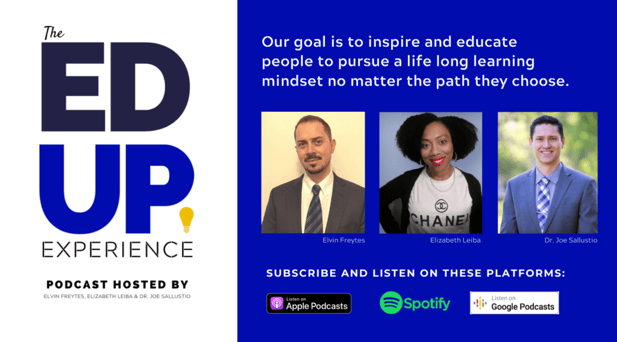Published on
The Emerging Role of the Community College in Higher Education

Community colleges have stepped up to the plate in a big way during this pandemic, and it doesn’t end here. Now more than ever, community colleges can plant a firm foot in shaping higher education as online learning becomes the common practice. In this interview, Joseph Sallustio and Elizabeth Leiba from EdUp Experience speak with David Stout about the opportunity community colleges have in this new normal, what’s in store for the future and what other institutions can learn from community colleges.
EdUp Experience: How have you adjusted institutionally and as a leader in response to the pandemic?
David Stout (DS): We had to transition primarily to remote, but the ones who are making personal sacrifices are those working in our physical plant. We have 1.2 million square feet of physical property, so they have a lot of surface area to maintain. Also, our security and police officers have had to be there every day.
Then, we’ve had just some other auxiliary-type services, mail services and things that folks have had to report to work every day. But predominately, the employees have been able to work in a remote environment. That was a bit of a shift for us. A pretty substantial number of our faculty were teaching courses remotely prior to the pandemic. About 70% of our employees trained to teach online–not that they were doing it every day–but the other 30% weren’t really trained to to do their work remotely, so getting them there was an incredibly substantial effort.
The frequency of my communications and the way in which I communicate had to change, but I’m a very transparent leader. I try to communicate as much as possible with my team of over 1,000 employees. I’ve been sending out messages multiple times a week, letting everybody know what’s happening at the college and what’s happening at the state level.
Over the last several months, there have been countless Zoom calls; we’re all feeling that screen fatigue. Working from home always sounded like it was a great thing, and now most of us want to get back into the office. Our employees are fatigued from the volume of work that they’ve had to do, but they’re really excited about opportunities for reopening and being able to reengage.
EdUp Experience: Do you see community colleges having a bigger opportunity to become more prominent in the higher ed space to redefine the traditional space?
DS: There’s no doubt, and we’re seeing that right now. Students who may not have considered community colleges before are now beginning to engage with us. We’re expecting a substantial increase in our enrollments because people want to go back school for more education. They’ll go back especially if they can predominately do distance and online learning. We have a robust platform that is able to support our students in that. Small class sizes allow students to get the one-on-one time they need, and the technology is there to support that.
Another major advantage is that most community colleges are comprehensive, so we focus on workforce development as well as transferable pathways for people to get bachelor’s degrees and beyond. Most community colleges have built some sort of pathway system between their non-credit side of workforce development and their credit side of providing certificate programs and degrees. People who may not have been thinking about coming back to school, who may have been financially affected by this devastating pandemic, may be looking to pivot in their career. They can get an assessment on work they’ve done and convert it into credentials. They’re able to come through the non-credit division for workforce development and work towards a degree.
EdUp Experience: What are your plans for the fall term and what have you done to ensure faculty are prepared for distance learning? What advice do you have for other institutions?
DS: We’ve given our faculty a lot of flexibility in choosing the modes that they want to teach in, in the fall. We know that some want to be back on campus, and we’re talking about all the things we need to do to ensure their safety. For those who are choosing to teach in-person, we know that we need to limit the number of students allowed in the room. We’ve talked about the types of technology that we’ll have to build into the system to help with that.
When it comes to preparing people for distance and online learning, this can really be complex because of the nature of the discipline that the faculty member is teaching. Some programs are a lot more complex in that environment, so we’ve had to be really creative, developing a lot of videos and having faculty members demonstrate through live technology. We need to have repositories of material that might be entered into the learning management system that allows everybody who teaches within that discipline to incorporate them into their classes. Faculty can support each other in that regard. It’s about looking at what content we have and sharing it with those who you think would benefit, so they don’t have to recreate the wheel.
EdUp Experience: Are you a believer in online education when it’s applicable to the specific program?
DS: I am a believer in online education, but it doesn’t work for everybody. There are certain characteristics that the student needs to have in order to succeed in an online environment. It takes a lot of self-discipline, self-management, and time management needs to be in place. And of course, having the right faculty member as a guide through the process is really important. When the faculty member is well prepared, trained, and they have the right materials and technology, then the students are self-selecting into that environment. That’s when you have the greatest chances for success.
It’s more concerning when there’s a mismatch. A student may not feel comfortable in that environment and may not have the necessary skills for it. They feel forced into it, that the only option for them is to learn completely online.
EdUp Experience: Is providing online and hybrid options a part of the basis to catering to your students?
DS: That’s definitely part of it. Catering to both our students and our employees. Some of our employees really want to be back in the classroom; they really need that one-on-one, face-to-face interaction. So, if we can find that match between the students and the faculty members who really want to be in the classroom, that’s a beautiful thing. Most community colleges are open access, meaning that students come to us from all different levels of academic preparation. Some of them may have struggled and others really succeeded in their classes. So, we’re starting to train them from the very beginning on how to use the learning management system. Many of them will opt to go completely online later in their careers. The issue is that most students entering the institution lack basic college knowledge and need a little more time with faculty. We’re concerned about students opting out of the face-to-face experience. That’s the reason for having the online live. We need to make sure that students feel that they have someone to interact with.
EdUp Experience: Can you talk a bit about the faculty perspective to develop that one-on-one relationship with a student that sometimes gets lost?
DS: The students’ relationships with their faculty members are really the most important relationships that they’re going to develop at the college. In our surveys, we’ve found that students will develop relationships with three types of people; a faculty member, a staff member (tutor, counselor, advisor, etc.) and a peer. Those three people have the most impact on a student’s success and persistence in education.
With the faculty-student relationship, the most important aspect for the student is that the faculty remember their name. They want to know that you care about them and their success. They need to both challenge the student and support them, helping the student grow and become better.
EdUp Experience: What can more traditional schools learn from community colleges?
DS: On the workforce development side of house, we’re constantly out in the community, engaging with the employers in our area. We always want to know what they need, what they’re looking for and the latest technologies that we need to incorporate into the learning experience. Budget wise, it’s not always easy to keep up with technologies and train people to use them, so there’s a little bit of a lag that exists between how a student in a four-year college is trained and what they’re going to be exposed to in the workforce. So, try to engage and maintain close relationships with employers, listening to what their needs are.
Bringing in organizations can also help. Have them talk about their needs to give a sense of what life is like outside of the classroom, so we can shape our programming to fit those needs. One thing that employers tell us is that graduates lack communication skills; they can’t work in a team, problem solve, or think critically. So, we’re trying to build those competencies into the learning outcomes. In doing that, by the time they’re graduates, they’ve and become sharper and more valuable employees to the industry, out in the real world.
EdUp Experience: With the high unemployment rate, is there a moment where you think about how community colleges can be a part of the solution?
DS: Yes, definitely. This is one of the areas in which community colleges have an advantage. They have the workforce development aspect and the non-credit division. People are able to quickly come in, upskill and get back into the workforce. They don’t have to go back to the start and get a degree all over again. I would recommend seeing whether your local community college has a small business development center. Those centers can provide your students and community valuable resources to get them back on their feet.
At Brookdale, we serve Monmouth and Ocean counties, which have small business development needs. We have a center on our Lincroft campus, where we’ve served over 700 small businesses during the pandemic, helping them fill out the forms that they need to get support.
EdUp Experience: What are your recommendations going forward as we are still in this pandemic for how to support your student?
DS: We’re going to see a rebound in some pretty severe psychological stress as a result of the pandemic, and that’s where we need to be prepared. We need to put those support services in place now to help address the situation when it arises. Especially when students are back in a high-stress environment, it’s going to start to trigger some of what they were experiencing in the spring.
EdUp Experience: Is there anything else you’d like to add and can you tell us what you believe the future of education looks like?
DS: Brookdale Community College is an amazing institution. There is an old-fashioned feel on campus, but we also have a very robust and modern online presence. There’s nobody better than those working in our teaching and learning center. We have instructional designers who help faculty design their courses and all the objects within their learning management system. We have a number of different online programs that we use to support students, all around the country and the world.
EdUp Experience: What do you think the future of higher education will look like?
DS: What we’re going to need to do is look at education as a lifetime experience but that can be broken up into a smaller, digestible pieces. We need to allow students to be able to enter the educational experience, go back into the workforce and return to us over a longer period of time. That might mean breaking a course up into modules and using badges to gain certificates–whatever is most valuable for students at that time. We don’t want to dilute the value of education; the value is beyond just workforce development. It helps improve people’s lives and their ability to think critically. So that’s the challenge: how to deliver content in a more digestible format while retaining the value of the overall experience of higher education.
This interview was edited for length and clarity.
Listen to the full interview here.
Disclaimer: Embedded links in articles don’t represent author endorsement, but aim to provide readers with additional context and service.




